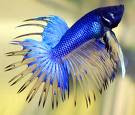Does your
Betta fish suffer from fin rot? The symptoms are usually pretty obvious, thinning or shredding fins, the edges turn brownish, small holes begin to appear and the poor little creature just doesn't look so hot. Well folks - that's a classic case of fin rot.
What is fin rot? Well in its simple sense, fin rot is a bacterial infection usually brought on by poor water conditions or from stress as a result of an illness.
How do you treat this infection? Normally you can treat your Betta with a fungus eliminator available at most pet stores. You should also be sure to keep your water clean and fresh. As an aid to healing apply 1 teaspoon of aquarium salt (not table salt) per gallon of water. Only add salt during water changes as it will not evaporate from water and will build up to toxic levels if added daily without changing water. Salt helps your Betta breath better which in turn speeds up recovery. To apply the fungal eliminator be sure to check the dosage on the package but normaly you would add 1/4 teaspoon per gallon of water every third day until noticable improvement is seen in your fish.
Please note that salt can be used as a preventative measure on a regular basis when changing water. Use only 1/4 teaspoon per gallon when your fish are healthy to help them stay that way.
If your Betta does not improve then you may be dealing with Flexibacter columnaris which is often mistaken for a fungal infection. Columnaris is also known as cotton mouth and you should see white spots or paleness on the mouth and edges of the fins and scales. If this is the case then you will have to treat your fish with copper sulfate, antibiotics and chemicals. Acriflavine, Furan, and Terramycin are the common treatments. If you use carbon filters you will have to discontinue filtration during treatment as the filter will remove the medications from the tank.
Columnaris is highly contagious so fresh water changes are a must and you should vacuum your gravel. Be sure to disinfect all equipment (nets, vacuum etc) to avoid spreading the disease. In chronic cases columnaris can appear slowly and take several days before killing your fish. In acute cases it has been known to kill entire populations of fish in a matter of hours. High water temperatures helps the disease spread rapidly. Unfortnately lowering the temperature will only slow it down but will not stop it. If your Betta has columnaris be sure to get treatment quickly.
How to prevent fin rot and columnaris? You can greatly reduce all types of illnesses by following a few simple steps. Quarantine all new fish for two weeks. (pet stores are the biggest source of disease) Maintain high water quality and provide fish with a well balanced diet. Always disinfect all equipment before each use to avoid spreading bacterium. These simple steps greatly reduce stress on all your fish and stress is the single largest contriutor to disease. Common sense - sure, but many fail to look after their fish properly so it is aways worth repeating these basic tenents of fish keeping.
If you would like more information on fin rot, columnaris or several other common Betta diseases you can visit us at;
Betta FishAbout the Author
The author is a lifelong Betta fish lover and you can visit his site at;
Betta FishLabels: betta, columnaris, disease, fin, finrot, fish, rot





